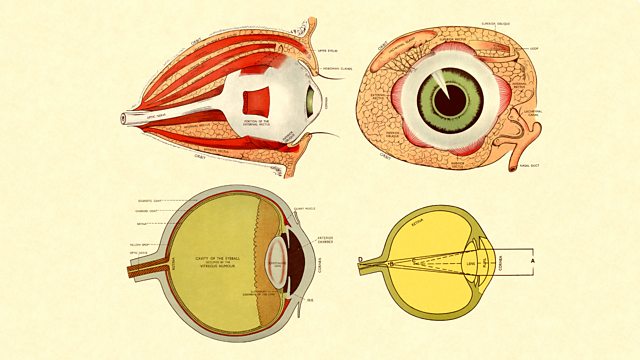The Eye
Melvyn Bragg and guests discuss the history of ideas about the eye and how it works.
Melvyn Bragg and his guests discuss the eye. Humans have been attempting to understand the workings and significance of the organ for at least 2500 years. Some ancient philosophers believed that the eye enabled creatures to see by emitting its own light. The function and structures of the eye became an area of particular interest to doctors in the Islamic Golden Age. In Renaissance Europe the work of thinkers including Kepler and Descartes revolutionised thinking about how the organ worked, but it took several hundred years for the eye to be thoroughly understood. Eyes have long attracted more than purely scientific interest, known even today as the 'windows on the soul'.
With:
Patricia Fara
Senior Tutor of Clare College, University of Cambridge
William Ayliffe
Gresham Professor of Physic at Gresham College
Robert Iliffe
Professor of Intellectual History and History of Science at the University of Sussex
Producer: Thomas Morris.
Last on
LINKS AND FURTHER READING
Ìý
Ìý
Ìý
Ìý
Ìý
Ìý
READING LIST:
Ìý
Vicki Bruce, Mark A. Georgeson and Patrick R. Green, Visual Perception: Physiology, Psychology and Ecology (Psychology Press, 2003)
Ìý
Leo Chalupa and John Werner, The New Visual Neurosciences (MIT Press, 2013)
Ìý
Olivier Darrigol, A History of Optics from Greek Antiquity to the Nineteenth Century (Oxford University Press, 2012)
Ìý
Richard Gregory, Eye and Brain: The Psychology of Seeing (Oxford University Press, 1997)
Ìý
David Hubel, Eye, Brain and Vision (Scientific American Library, 1988)
Ìý
Toby E. Huff, The Rise of Early Modern Science: Islam, China and the West (Cambridge University Press, 2003)
Ìý
Simon Ings, The Eye: A Natural History (Bloomsbury, 2007)
Ìý
Michael F. Land and Dan-Eric Nilsson, Animal Eyes (Oxford University Press, 2001)
Ìý
David C. Lindberg, Theories of Vision from Al-Kindi to Kepler (University of Chicago Press, 1996)
Ìý
David C. Lindberg, The Beginnings of Western Science: The European Scientific Tradition in Philosophical, Religious, and Institutional Context, Prehistory to AD 1450 (University of Chicago Press, 2008)
Ìý
David Park, The Fire Within the Eye (Princeton University Press, 1999)
Ìý
A. I. Sabra, Theories of Light: From Descartes to Newton (Cambridge University Press, 1981)
Ìý
Mark Smith, Ptolemy and the Foundations of Ancient Mathematical Optics (American Philosophical Society, 1999)
Ìý
Mark Smith, Alhacen’s Theory of Visual Perception (American Philosophical Society, 2001)
ÌýÌý
Nicholas Wade, A Natural History of Vision (MIT Press, 2000)
Ìý
Credits
| Role | Contributor |
|---|---|
| Presenter | Melvyn Bragg |
| Interviewed Guest | Patricia Fara |
| Interviewed Guest | William Ayliffe |
| Interviewed Guest | Robert Iliffe |
| Producer | Thomas Morris |
Broadcasts
- Thu 27 Feb 2014 09:00Â鶹ԼÅÄ Radio 4
- Thu 27 Feb 2014 21:30Â鶹ԼÅÄ Radio 4
Featured in...
![]()
20th Century—In Our Time
Browse the 20th Century era within the In Our Time archive.
![]()
Science—In Our Time
Scientific principles, theory, and the role of key figures in the advancement of science.
![]()
In Our Time: Science - Top 10—In Our Time
The top ten programmes to listen to from In Our Time's Science archive.
In Our Time podcasts
Download programmes from the huge In Our Time archive.
The In Our Time Listeners' Top 10
If you’re new to In Our Time, this is a good place to start.
Arts and Ideas podcast
Download the best of Radio 3's Free Thinking programme.
Podcast
-
![]()
In Our Time
Melvyn Bragg and guests discuss the ideas, people and events that have shaped our world.



